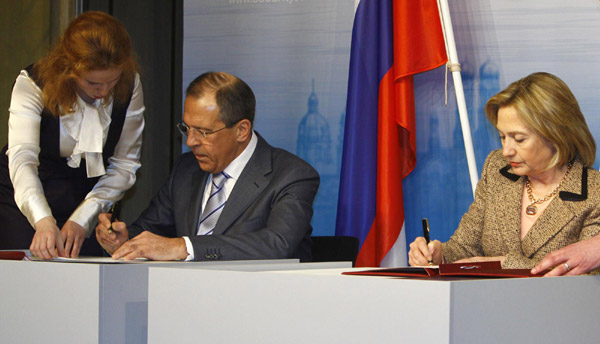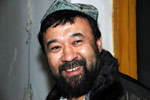Diplomatic and Military Affairs
New START treaty takes effect
Updated: 2011-02-06 10:43
(Xinhua)
|
 US Secretary of State Hillary Clinton and Russian Foreign Minister Sergei Lavrov sign documents formally bringing into force the landmark nuclear arms reduction pact START during the 47th Conference on Security Policy in Munich February 5, 2011. [Photo/Xinhua]
|
MUNICH - A new nuclear arms treaty between the United States and Russia that limits the number of atomic warheads the two former Cold War enemies are permitted to possess took effect Saturday.
US Secretary of State Hillary Rodham Clinton and Russian Foreign Minister Sergey Lavrov exchanged instruments of ratification on the sidelines of the 47th Munich Security Conference. The New START treaty was approved by the US Senate in December after President Barack Obama pressed strongly for its passage. Russia ratified the 10-year agreement, which can be extended by another five years, last month.
| ||||
Lavrov said the principles of parity, equality and undivided security stipulated by the New START treaty, negotiated last year, set a solid foundation for Russian-American cooperation in different areas.
"The treaty that enters into force today will enhance international stability," Lavrov said. Clinton called the treaty "an example of clear eye cooperation that is in everyone's interest."
"When it comes to the button that has worried us the most over the years -- the one that would unleash nuclear destruction -- today we take another step to ensure it will never be pushed," Clinton told reporters after the treaty went into effect.
The agreement will slash existing warhead ceilings by 30 percent over the next 10 years from current a current cap of 2,200 to 1550 and limits each side to 700 deployed long-range missiles and heavy bombers.
The pact also re-establishes a monitoring system that ended in December 2009 with the expiration of an earlier arms deal. Russia and the US have the right to conduct onsite inspections beginning 60 days from the agreement going into effect Saturday.
Although the weapons ceiling in the new treaty is far more encouraging than those in previous agreements, the pact only limits deployed strategic nuclear weapons.
"We have made absolutely clear that we will not accept any constraints on our missile defense systems," Clinton said, adding that actions will be taken this year to deploy radar systems abroad for training.
"We have also discussed further arms control conditions that include nonstrategic and undeployed nuclear weapons," she said.
Both countries expressed reservations when approving the treaty.
The US Congress did not consider the preamble to the agreement to be legally effective and the pact doesn't restrict the deployment of missile defense systems, including those in Europe.
To counter that, Russia reserved the right to withdraw from the treaty if the US violates its provisions, unilaterally deploys missile defense systems that "qualitatively violate" Russian security or takes some other inappropriate unilateral actions.
UN Secretary-General Ban Ki-moon hailed the treaty's entering into force as "a historical, political milestone on the road to our ultimate goal: achieving a world free of nuclear weapons."
He applauded the "leadership and political commitment" of Russian President Dmitry Medvedev and Obama.
Specials

Spring Festival
The Spring Festival is the most important traditional festival for family reunions.

Top 10
A summary of the major events both inside and outside China.

A role model
Alimjan Halik had been selected as the "Cyberspace Personality Who Moved the Hearts of the Chinese in 2010".



